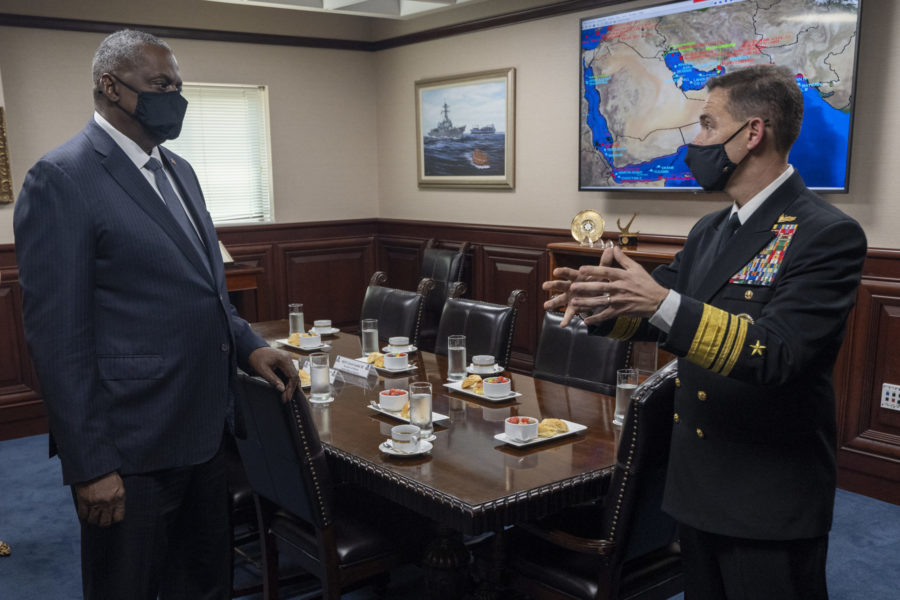Capping his Gulf state tour in Kuwait, Defense Secretary Lloyd J. Austin III visited Marines present during the Aug. 26 Kabul airport attack and warned that Al-Qaida may emerge in the chaos now enveloping Afghanistan.
On the final day of his visits to Qatar, Bahrain, and Kuwait, Austin thanked the crucial partners responsible for helping to transit 124,000 evacuees from Afghanistan in 17 days. The feat, Austin said, required those partners to surge their capabilities and make quick adjustments so the Defense Department and interagency partners could respond to the humanitarian needs, including providing food, water, shelter, and medical attention to the Americans, endangered Afghans, and third-country nationals flowing through American air bases.
Austin stressed the successful operation while downplaying the havoc witnessed on the tarmac at Hamid Karzai International Airport, where the Taliban provided perimeter protection. But the Defense Secretary also acknowledged the danger of a reconstituted terrorist group under a permissive governance by the Taliban.
“The whole community is kind of watching to see what happens and whether or not Al-Qaida has the ability to regenerate in Afghanistan,” Austin said. “The nature of Al-Qaida and ISIS-K is they will always attempt to find space to grow and regenerate.”
Austin told traveling journalists in Kuwait City that the Taliban had been put “on notice” and that the international community was watching to see how they will act under the scrutiny.
“One of the ways the Taliban can demonstrate that they are serious about being a bona fide government and respected in an international community is to not allow that to happen,” he said.
Austin said the United States would retain an “over-the-horizon” counterterrorism capability in the region, understood to be the ability to fly intelligence, surveillance, and reconnaissance missions as well as conduct armed strikes from the very Gulf bases he visited this week.
He did not describe any new capabilities closer to Afghanistan. Currently, drones must commute four hours each way from Al Udeid Air Base in Qatar to reach Afghanistan, giving them little time to hover over the country.
Austin declined to describe the nature of over-the-horizon basing relationships with the Gulf countries, saying it was not part of his discussions.
“We’ve maintained capability in the region,” he assured. “We maintain capability from other places. We have the ability to do a heck of a lot more now from greater distances than we could 20 years ago.”
With the Taliban announcing a new interim government of hardline loyalists in recent days, Austin was questioned on his assessment of Afghanistan.
“The landscape has changed a bit with the Taliban taking over,” he said. “We’ll continue to watch and make sure that we remain vigilant on any type of capability that’s being developed in the region that can export terror to the homeland.”
Austin said Al-Qaida and ISIS-K will seek ungoverned spaces where they can grow but that the Taliban will be cut off from international recognition and the resources it needs to govern if it harbors terrorist groups.
“If they demonstrate that they’re going to harbor terrorism in Afghanistan, all of that will be very, very difficult for them to achieve,” Austin said.
“It’s the Taliban’s government. We don’t get a vote in that,” the Secretary said when asked about the government composition of Haqqani network fighters who have targeted American Soldiers in the past. “These are people that I don’t look favorably upon personally. But again, it’s the Taliban’s government.”
While in the Gulf, Austin visited American interagency personnel at Naval Support Activity Bahrain, members of the 24th Marine Expeditionary Unit, and the Special Purpose Marine Air-Ground Task Force, Crisis Response in Kuwait who helped with the evacuation in Kabul and were present during the ISIS-K terrorist attack.
Those units were more concerned with how their comrades were doing back at Walter Reed National Military Medical Center, Austin said.
“The first question from them is, ‘How is so and so doing?’ and they’re talking to them on a daily basis, cell phone, and that sort of stuff,” Austin said.
“When I visited the Marines in the hospital, half of them were starting to do push-ups even though they were injured. They were still trying to do P.T. in the hospital. But that’s to be expected with these young warriors,” Austin added. “They always go above and beyond the call.”
